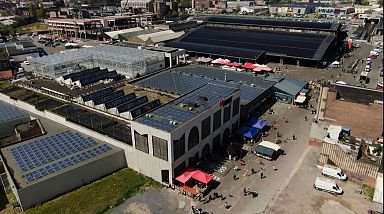The cost-of-living crisis and the climate emergency are forcing industries to rethink their approach to their day-to-day practices.
Nestled in the heart of Brussels’ urban landscape lies a green oasis, the FOODMET. As the city's largest covered market for fresh vegetables and produce, this building – co-financed by Europe – prides itself on its commitment to energy efficiency and sustainable practices.
Energy Efficiency
The crown jewel of the FOODMET is the BIGH urban farm, located on the building's rooftop. Using the building's waste heat, the farm grows vegetables and breeds fish.
Audrey Boucher, Site Manager of the BIGH Brussels aquaponic farm, explains, "We're on the roof of FOODMET, a food market with many cold rooms. These cold rooms emit heat, and we can harness this energy to heat our greenhouses and cool the water for the fish."
The pilot farm, operational since 2018, uses an aquaponics technique – a process of filtering fish excrement from the water to be used as fertilizer – to produce 200,000 pots of basil and other aromatic herbs, and 20 tons of salmon trout each year.
Julien Verloop, Aquaculture Manager of BIGH Brussels aquaponic farm, adds, "We're in a closed circuit. The water will circulate again in the system and only a part of it will be utilized to meet the plants' needs."
Green Funding
The market stands as a beacon for the city's climate goals, and according to Paul Thielemans, Public Relations representative of ABATTOIR NV-SA, it can serve as a blueprint for sustainable urban farming.
"It has so many advantages," says Thielemans. "I'm talking about employment, biodiversity, capturing rain and city water, and making rooftops more appealing from an urban perspective with farms."
The total budget for the FOODMET is €18 million, of which €6 million comes from the European cohesion policy, supplemented by a further €1.4 million to fortify the roof and terraces. These funds are crucial for the project's survival.
Thielemans adds, "If this model is to be replicated in other cities, we need to recognize the role of private investment as well as the significance of public subsidies."












